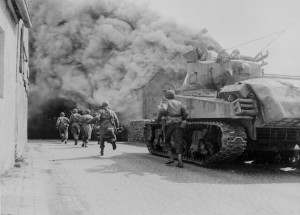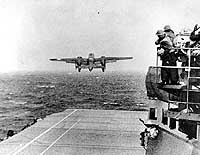
Soldiers of the 55th Armored Infantry Battalion and tank of the 22nd Tank Battalion move forward.
When World War II officially ended on September 2, 1945, and the Allies were declared victors, German and Japanese cities and industries were in shambles, having been bombed repeatedly even before the two A-bombs were dropped.
Too soon thereafter, the Russian Bear ambled forward, promoting Communist movements throughout the European countries that had recently been freed from the grip of the Nazis, mostly by the Soviets.
In the Far East, similar movements threatened new formed democracies carefully cultivated by the United States and what was left of the United Kingdom. All of this kicked off the Cold War that America ultimately won in the early 1990s when the Soviet Union collapsed from the weight of its defense spending and failed planned economies.
But an unrecognized consequence of the Cold War has been that Detroit became the victim of our policies to thwart the Soviets.
In Japan, every major city except Kyoto had been virtually destroyed with fire bombs, and Soviet invaders took the northernmost Kurile Islands. During the American Occupation, General Douglas MacArthur decreed that General Motors and Ford Motor Company would not be allowed to reopen their factories in Japan. Before the war, GM had operated an assembly plant in Osaka and Ford, an assembly plant in Yokohama.
Their cars and trucks had been popular with the Japanese public prewar when there was little domestic Japanese automaking. Postwar, the Japanese government ordained that no foreign company could own a majority interest in a Japanese company, and imports were severely restricted by currency and non-tariff barriers.
As it dawned on American leaders that the Soviets were not our friends, propping up the economies of Japan and Germany became our national policy, paid for by U.S. taxpayers. According to the Congressional Research Service, from 1946 to 1952, Japan received $15.2 billion (in 2005 dollars) of U.S. aid to feed its starving people and rebuild.

Tokyo bound: An Army Air Force B-25B takes off from USS Hornet.
The situation in Europe was, if anything, worse. Under President Truman’s guidance, the Marshall Plan was launched to stave off economic collapse among friend and former foe alike. Germany, with $29.2 billion (in 2005 dollars) of U.S. aid, was the third largest recipient of Marshall Plan largesse after the United Kingdom and France.
This generosity extended to former enemies Japan and Germany (and to a lesser extent, Italy) was just the beginning. Since the mid-1950s, American taxpayers have anted up billions of dollars for the U.S. Defense Department budget, much of it to protect Japan and Germany from Soviet ambitions.
In 1945, Soviet-supported Communists also had grabbed what became known as North Korea. American taxpayers and GIs paid dearly to defend South Korea from Communist invasion of 1950. Today the so-called Peoples Republic of Korea (North Korea) remains a threat to peace in Asia, so the U.S. still maintains a substantial military presence in South Korea and Japan, while the Korean and Japanese government restrict imports.
The taxpayers of Japan, Germany and South Korea supported only extremely modest defense budgets, because U.S. taxpayers were doing it for them until we won the Cold War.
In effect, U. S. taxpayer subsidies allowed those countries both to build modernized industries and to provide their citizens with pensions and health care that employers in the United States provided their employees out of sales revenues.
Yet that wasn’t the only unfair advantage enjoyed by countries that were supported by U.S. taxpayers. While we permitted them to market freely in our country, we were and are restricted in theirs to varying degrees. The impact has struck several industries, including electronics and optics, but Detroit’s automakers have, arguably, suffered the most.
In fairness, we have to recognize it is unlikely the losers of World War II would want to buy the products of the victors. It may or may not be true that the cultures of Germany and Japan preclude buying American cars. Certainly in Germany or Japan, unlike the United States, you would never see government employee parking lots filled with imported brands.
However, in Japan, the belief that the motoring public won’t accept American cars is thrown into question by a demonstrably strong demand for used and bootlegged new American cars and trucks, and thriving publications devoted to American culture and autos. We will never know if it could have been different.
You might call us “Uncle Sucker.” We won the war only to lose it by bankrolling the economies of our enemies. Yet political and media critics blame this on American business management rather than short-sighted government economic and foreign policy.
Indeed, unlike our former enemies, as well as most former allies, the United States has never had a national industrial policy.

We won the Cold War and lost the peace. Containment proved to be a good strategy and transforming our enemies into allies created a countervailing force against the Soviet Union both militarily and commercially. But once our new found allies were back on their feet we should have adjusted our security arrangement with them and nurtured our manufacturing sector in the same way we funneled enormous scientific and technical resources into high tech weaponry.
We created a nuclear umbrella but forgot that the true definition of national security isn’t about throw weight but about being able to provide a decent way of life for our citizens. That means jobs, good wages, health care, good schools and a healthy environment. Oh, and a decent, high mileage, fun to drive car.